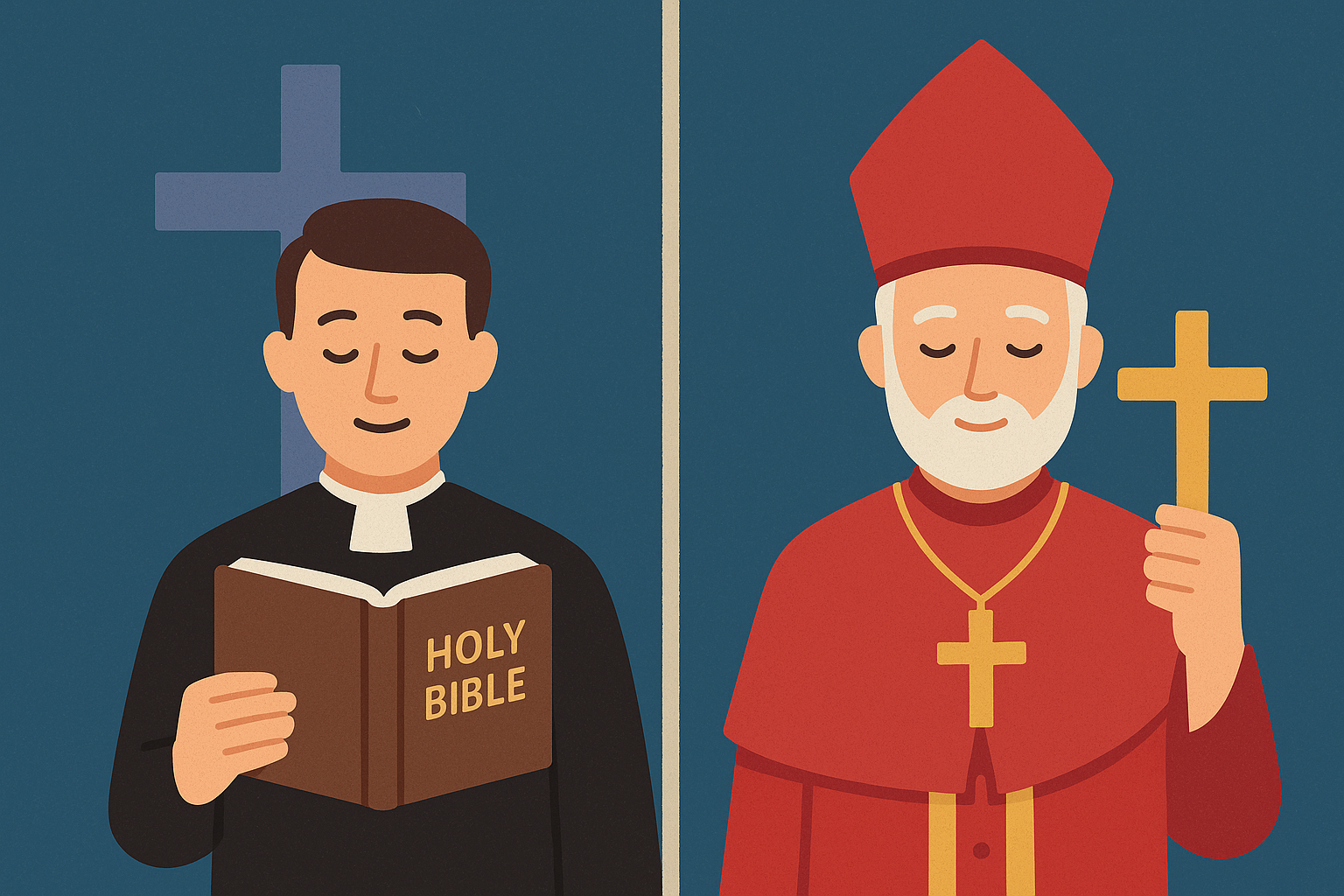Have you ever wondered about the differences between Baptist and Catholic beliefs? You’re not alone.
Many people are curious about how these two branches of Christianity differ in their teachings, practices, and history. Understanding these distinctions can be enlightening and might even shift your perspective on faith. This article will guide you through the key differences, making it easy for you to grasp the essentials without needing a theology degree.
Get ready to explore the fascinating contrasts between Baptists and Catholics, and discover insights that could resonate deeply with your own spiritual journey.
Historical Background
The historical background of Baptist and Catholic traditions presents a fascinating journey. Each has unique roots that shaped their beliefs and practices. Understanding these origins helps clarify the differences between them.
Origins Of Baptism
Baptists trace their origins to the early 17th century in England. They emerged from the Puritan movement, seeking religious reform. Baptists emphasized personal faith and adult baptism. They believed baptism should follow a personal commitment to Christ. This contrasted with infant baptism practiced by other denominations. Their focus was on individual faith and scripture.
Baptism for Baptists was a public declaration of faith. It symbolized spiritual rebirth and cleansing. They rejected traditions that did not align with biblical teachings. This commitment to scripture led them to grow rapidly. Baptists spread across continents, forming diverse communities.
Catholic Church Development
The Catholic Church traces its roots to the early Christian communities. It has a rich history dating back to the first century. Catholics believe their church was founded by Jesus Christ. The apostle Peter is considered the first pope. This connection to the apostles is central to Catholic identity.
The Catholic Church evolved over centuries. It established traditions, sacraments, and a hierarchical structure. The papacy became a significant institution. Catholicism spread through missionary work and political alliances. It became a dominant force in Europe and beyond.
Key to Catholicism is the belief in the seven sacraments. Baptism is one of these, performed shortly after birth. Catholics see baptism as a means of grace. It cleanses original sin and initiates entry into the church. This practice is rooted in ancient traditions.

Core Beliefs
Understanding the core beliefs of different religious denominations can be a journey into discovering what truly resonates with you. Whether you grew up attending church every Sunday or you’re simply curious about religious perspectives, the differences between Baptist and Catholic beliefs can be both enlightening and surprising. Let’s delve into the essence of what sets these two apart, providing you with a clearer picture of their doctrines.
Baptist Doctrine
Baptists emphasize the importance of individual faith and the authority of the Bible. They believe that salvation is a personal decision—often made publicly through baptism. Baptism is performed by immersion, symbolizing a profound commitment to faith.
A key aspect of Baptist doctrine is the autonomy of each local church. This means that churches govern themselves independently, without a central authority. This principle allows for a variety of worship styles and community focuses across Baptist congregations.
Have you ever considered how personal interpretation impacts your spiritual journey? Baptists encourage personal study of the scriptures, fostering a direct relationship with God without intermediaries. This independence can be empowering but also challenging, as it requires individuals to actively engage with their faith.
Catholic Doctrine
Catholic beliefs center around the traditions and teachings of the Church. The Pope and the Vatican play a significant role in guiding Catholic practices and beliefs. Catholics follow sacraments, including baptism, communion, and confirmation, which are seen as vital components of spiritual life.
Unlike Baptists, Catholics practice infant baptism, viewing it as a way to cleanse original sin. This sacrament reflects the communal aspect of faith, connecting individuals to the broader Catholic community from an early age.
The Catholic Church emphasizes the importance of tradition and communal worship. Mass and the Eucharist are central to Catholic worship, offering a shared experience of faith. Have you experienced the power of community in your spiritual journey? The Catholic approach highlights the significance of belonging to a wider faith community.
Both Baptist and Catholic doctrines offer unique perspectives on faith and spirituality. As you explore these beliefs, consider what aligns with your personal values and experiences. How do these differences shape your understanding of faith? The answers may lead you to a deeper connection with your spiritual self.
Worship Practices
Understanding the worship practices in different Christian denominations can be a fascinating exploration. Baptists and Catholics, while both rooted in Christianity, have distinct approaches to worship that reflect their theological and historical backgrounds. As someone who grew up attending various churches, I found the differences in worship styles intriguing. The Baptist services often felt informal and personal, while the Catholic Mass seemed steeped in tradition and ritual. Let’s dive into what sets these two apart in their worship practices.
Baptist Worship Style
Baptist worship is often characterized by its simplicity and focus on the Word of God. Services typically include hymns, prayers, and a sermon. Music plays a significant role and can range from traditional hymns to contemporary Christian songs.
In my experience, Baptist services are more spontaneous, with congregants encouraged to express themselves freely. This can include singing, clapping, or even sharing personal testimonies. The emphasis is on community and personal connection to God.
You might find it refreshing that Baptists often have a casual dress code, reflecting their belief that worship is more about the heart than the appearance. Have you ever wondered how this approach impacts the congregation’s engagement?
Catholic Mass Rituals
The Catholic Mass is rich in symbolism and tradition. It follows a structured liturgy that includes readings, prayers, and the Eucharist. Each part of the Mass has a specific purpose and meaning, creating a sense of reverence and continuity.
One striking aspect is the use of symbols and rituals, such as the sign of the cross, incense, and kneeling. These elements are designed to foster a deep sense of spirituality and reflection among participants. This might be why some people find Catholic services more solemn and meditative.
Have you ever attended a Mass and felt the weight of history and tradition? The rituals are centuries old, connecting worshippers to the roots of their faith. It’s worth contemplating how these practices influence your spiritual experience.
As you consider these differences, think about which style resonates with you more. Does the informal Baptist approach appeal to your sense of community, or do the rich traditions of the Catholic Mass speak to your spiritual heritage? Your preference might reveal something insightful about your own worship journey.

Sacraments And Ordinances
Understanding the differences between Baptist and Catholic practices enhances spiritual insight. Both traditions hold deep respect for their rituals. Yet, they approach them differently. Baptists refer to them as ordinances. Catholics call them sacraments. Each term reflects unique beliefs and practices.
Baptist Ordinances
Baptists observe two main ordinances: baptism and the Lord’s Supper. These acts are symbolic. They represent important spiritual truths. Baptism involves full immersion in water. It signifies personal faith and commitment. Baptists believe it follows a personal decision to follow Jesus.
The Lord’s Supper, also known as communion, is another ordinance. It serves as a reminder of Jesus’ sacrifice. Baptists partake in bread and wine. They see it as an act of remembrance. It does not convey grace but reinforces faith.
Catholic Sacraments
Catholics recognize seven sacraments. Each sacrament holds deep spiritual significance. Baptism is the first sacrament. It’s seen as a means of grace. It cleanses original sin and initiates into the faith community.
The Eucharist, or Holy Communion, is central in Catholic worship. Catholics believe in transubstantiation. The bread and wine become the body and blood of Christ. This sacrament is vital for spiritual nourishment.
Other sacraments include Confirmation, Reconciliation, Anointing of the Sick, Holy Orders, and Matrimony. Each plays a unique role in a Catholic’s spiritual life. They are believed to convey grace at different life stages.
Church Authority
Baptists and Catholics differ in church authority and structure. Baptists emphasize individual belief and autonomy. Catholics follow hierarchical leadership with the Pope at the top.
Church Authority is a fundamental aspect that shapes the structure and governance of religious communities. It dictates how decisions are made, who holds power, and the overall direction of the church. Understanding the differences in church authority between Baptists and Catholics can offer insights into their unique practices and beliefs. As you explore these differences, consider how church authority influences your own spiritual journey and community engagement.
Baptist Leadership
Baptists embrace a decentralized form of church authority. They believe in the autonomy of each local congregation. This means that individual churches make their own decisions without a central governing body.
Pastors and elders lead through the guidance of the congregation. They are elected by church members, empowering the community to shape its own path. This democratic approach might remind you of community meetings where everyone has a say.
Have you ever been part of a group where every voice matters? Baptist leadership echoes that, valuing personal involvement and accountability.
Catholic Hierarchy
In contrast, Catholics follow a structured hierarchy. The Pope, as the supreme leader, guides the global Catholic community. Beneath the Pope are cardinals, bishops, and priests, each with specific roles and responsibilities.
This hierarchy is like a well-organized team where each member knows their role. It ensures consistency in teachings and practices worldwide. Catholics look to their leaders for spiritual guidance and direction.
Reflect on how a clear structure might impact your sense of belonging and certainty in your faith. Do you find comfort in knowing there’s a roadmap to follow?
Views On Baptism
Baptists and Catholics differ in their views on baptism. Baptists practice believer’s baptism, focusing on personal faith. Catholics perform infant baptism, emphasizing original sin and grace.
Understanding baptism is key to appreciating the differences between Baptist and Catholic faiths. While both traditions celebrate baptism as a significant rite, their beliefs and practices differ remarkably. These differences affect how the followers of each faith view their relationship with God, the church, and their spiritual journey.
Baptist Baptism Beliefs
Baptists believe baptism is a public declaration of faith. It is performed only for those who have made a personal decision to follow Christ. Baptism is seen as an outward expression of an inward change.
In the Baptist tradition, baptism is done by full immersion in water. This symbolizes the death, burial, and resurrection of Jesus. If you’ve attended a Baptist baptism, you might have noticed the emphasis on the individual’s conscious choice.
Baptists hold that baptism should follow a personal acceptance of Jesus. This is why infant baptism is not practiced. They believe a conscious commitment to faith is essential for baptism to be meaningful.
Catholic Baptism Traditions
Catholic baptism, on the other hand, is a sacrament of initiation into the faith. It is usually performed shortly after birth. This practice underscores the belief in original sin, which baptism cleanses.
Catholics typically baptize by pouring or sprinkling water over the head. This method is symbolic of spiritual cleansing. You might find it interesting that godparents play a crucial role in this ceremony, pledging to guide the child in their faith journey.
In Catholicism, baptism is not only about faith; it’s also a means of grace. It marks the beginning of a lifelong journey with God and entrance into the church community. The ceremony is rich with tradition and symbolism, demonstrating the broader communal aspect of Catholic faith.
Have you ever considered how these different views on baptism might shape one’s spiritual life? Understanding these practices can offer you deeper insights into how beliefs are lived out in different faith communities.
Role Of Scripture
The role of scripture is central in both Baptist and Catholic faiths. Both denominations view the Bible as sacred and authoritative. Yet, their approach to interpreting it differs significantly. This difference influences their beliefs, practices, and teachings.
Baptist Bible Interpretation
Baptists emphasize a personal connection with the Bible. They believe in individual interpretation guided by the Holy Spirit. Each person can read and understand scripture personally. This approach encourages personal faith development and responsibility. Baptists often prioritize a literal interpretation of the Bible. They rely on the Bible as the sole authority in faith matters.
Catholic Scripture And Tradition
Catholics hold scripture and tradition as equally important. They see the Bible as part of a larger faith tradition. The Catholic Church believes in the teachings passed down from the apostles. Church authority and tradition help interpret the Bible. This ensures teachings remain consistent with historical church beliefs. Catholics embrace both scripture and tradition for a holistic understanding of faith.
Significant Differences
Baptists and Catholics differ in their beliefs and practices. Baptists emphasize personal faith and baptism by immersion. Catholics focus on traditions, sacraments, and the Pope’s authority.
When exploring the world of Christianity, one may wonder about the differences between Baptists and Catholics. While both are rooted in Christian beliefs, they diverge significantly in their practices and interpretations of the Bible. Understanding these differences can enrich your knowledge and appreciation of diverse religious traditions.
Theological Differences
Baptists and Catholics hold distinct theological beliefs. Baptists emphasize individual faith, believing that personal acceptance of Jesus is crucial for salvation. This belief is reflected in their practice of adult baptism.
Catholics, on the other hand, practice infant baptism and believe in the sacraments as channels of grace. They uphold the authority of the Pope and tradition, alongside the Bible.
These differing views influence their worship styles. Baptists often focus on sermons and Bible study, while Catholic services are structured around rituals and the Eucharist.
Cultural And Social Impacts
The cultural and social impacts of these differences are profound. Baptists tend to prioritize congregational autonomy, fostering community decisions in church matters. This can lead to a diverse range of practices and beliefs even within Baptist communities.
Catholics, with their hierarchical structure, often have more uniform practices and beliefs. This unity can create a strong global community, but may sometimes limit local flexibility.
In many societies, these differences influence everything from education to charity work. Catholic schools, for instance, often incorporate religious teachings into their curriculum, while Baptist institutions might focus more on personal faith development.
Frequently Asked Questions
What Are The Main Beliefs Of Baptists?
Baptists emphasize personal faith in Jesus Christ, believer’s baptism, and the authority of the Bible. They practice congregational governance, meaning each church is autonomous. Baptists also advocate for religious freedom and the separation of church and state.
How Do Baptists And Catholics View Baptism?
Baptists practice believer’s baptism by full immersion, emphasizing personal faith. Catholics practice infant baptism, viewing it as a sacrament that cleanses original sin. This fundamental difference highlights their distinct theological approaches to faith and sacraments.
Do Baptists And Catholics Have Similar Worship Services?
Baptist services are usually informal and focus on sermons and Bible study. Catholic services, known as Mass, are more structured and include liturgical elements like prayers and sacraments. These differences reflect their distinct traditions and theological priorities.
What Is The Baptist View On The Bible?
Baptists believe the Bible is the sole authority for faith and practice. They emphasize personal interpretation and study of Scripture. This belief underscores the Baptist commitment to individual faith and the autonomy of each congregation.
Conclusion
Understanding differences between Baptists and Catholics can enrich your faith journey. Both share a commitment to Christianity, yet practice it uniquely. Baptists focus on individual faith and baptism by choice. Catholics emphasize tradition, sacraments, and the Pope’s authority. Each offers a distinct path to spiritual growth.
Whether you align with Baptist beliefs or Catholic traditions, your faith can deepen. Explore further, ask questions, and reflect. Your journey is personal and meaningful. Embrace the diversity of beliefs and practices. It can enhance your understanding and appreciation of Christianity.

I’m someone who’s always been fascinated by how small differences can lead to big understanding. That’s why I love writing “What’s the difference between…” content; it helps me explore topics from multiple angles and explain them in a clear, practical way. Whether it’s tech, productivity, business, or everyday decisions, I enjoy making complex ideas easier to compare, understand, and act on.










